|
 Genova:
stories sung Genova:
stories sung
Minstrel show from Alessio Lega and Marco Rovelli, with Guido
Baldoni at the accordion
We tell Genoa. We tell the joy and the revolution of Genoa. Tell
a momentous fact that changed our lives. We tell the story of
rebels who want to be 150 years a more just world, another world
is possible. We tell the pain of broken stories that have broken
the story. Tell a thousand hopes and tears that still laughing.
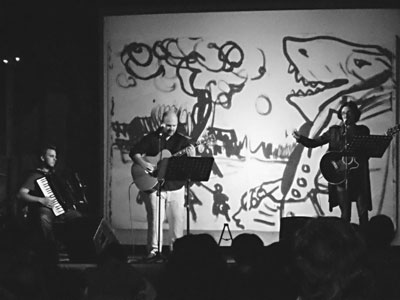
This is a show that takes a great folk tradition, now abandoned,
that of the Storyteller.
The Storyteller was information
recounted events large and small, made news and comment. He
brought with him also some legends, some fables.
His
perspective was that of the people, not for abstract reasons, but
because of the people was a direct emanation. This gave its
origin to his stories a precise point of view, often not
consistent with that of power. As we would say today was
"counter". As we always knew it was poetry of
reality.
These are the words with which I and Marco Rovelli
present the show that debuted in Genoa in July 2011 for the tenth
anniversary of the G8, and since then we've carried around for
Italy. I try to describe, from the inside, what is this show.
Con quella faccia un po’ così…
We met often, we who have been to Genoa.
Me and
Marco Rovelli we met often in the name of Genoa, to sing and
testify, and ten years have passed since those days of blood and
pain, laughter and salt water and steep ascents.
We have that
story told and sung, first to those who had been with us and
those who had followed the news exciting and terrible clinging to
radio and television news. Then, increasingly, has come to the
edge of the stage to a generation that had not been in Genoa,
that there could have been because at the time he was 10, 8, 6
years ... and so without leaving Genoa entered the history of our
personal stories.
Genoa was a point of arrival where they had
confirmed our worst doubts, which had broken some thin hope. In
2001 we were both too old to lose our childhood, to be greedy
amputees hope: I was 28 and Marco 3 more. But the proportions of
a nightmare so far we had not yet lived, and a nightmare is still
the wrong side of a dream.
July 2001 was indeed a historic
transition. Not everything is understood from Genoa and we
clarified many things from then on, that a certain way of doing
politics was setting. That the movement which had as reference
the experience of compasses social centers - where I grew up
politically and artistically - arrived there at its zenith, at
its moment of maximum exposure, which coincided with an
unprecedented crisis. Unsolder the story definitely Italian
political parties and movements from the movement to come: no one
could go to the box-office election after Genoa. No one has been
able (or willing?) Shed light on the story by benches of
parliament.
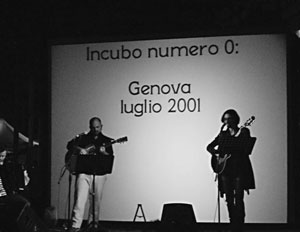
Who we are.
Marco
and I we are still, ten years from Piazza Alimonda march beaten
by the next day, by Diaz and Bolzaneto, with the urgency to tell
how our lives and our stories revolve around those fateful days.
How to reference our stories, our lives together, have converged
on Genoa for a moment to stop and start from there.
I came
away from that massacre with a song, a little 'shot:
(…) Who
are we? Now we are the sea, black sea that rages
that spills
over to the port, over which the hog poisoning
the sea more
salty tears that we have done
give a kiss to your candles,
just before drowning.
Who are we? Now we are the wind that you
can not be held hostage
free air from the mills, the
assembly
the wind will sweep away, erase the trace of your
footsteps
you crash into walls and barriers for unleashing
Marassi.
Who are we? Now we are the fire that you
never tamed
the burning in his eyes this Grey supermarket
that
short-circuits the wires to the alarm and the prohibition
while
we rub salt on the ruins of Bolzaneto.
Who are we? Now we are the night, the
moon lost the desperate
the poet says: "When a man falls,
gets up markets"
and for this man of eternal night, this
light that he dies
wait for the sun to melt the black block
that we carry in our hearts. (...)
But
from Genoa on - and more - it's hard to say "we," who
is that "we"? There is a shared memory, a set of
reference points, a common tradition? Today it is hard to say
"we", for fear that this "we" many, too many
people feel excluded. Today, individual hand histories to
individuals. These stories, however, always find themselves in a
collective history.
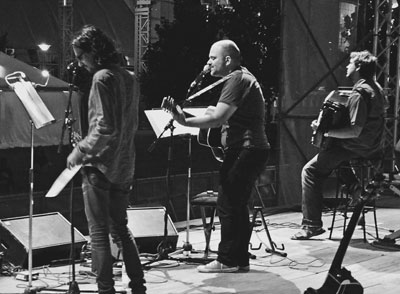
Our histories.
Louise
Michel, who took part in the Paris Commune, which escaped the
summary executions of weeks of blood, which is deported to New
Caledonia and there cries for 5 minutes on comrades killed. Then
she looks around and sees that there is too much to do to get
lost in memories. Rediscovers her original vocation and became a
teacher for native Canach children.
Sometimes I think the
teacher Louise Michel, seeing spell the word "Freedom"
to one of his students to the brutalization torn and illiteracy,
think that basically the City has won.
Sophie Scholl and the
White Rose. The group of students in their twenties than in full
Nazi Germany began, all alone, a strength of passion and courage.
6 leaflets spread, then they were taken and cruelly killed after
a show trial. The old Thomas Mann said of them, "Beautiful,
brave young people. You will not die in vain, you will not be
forgotten. The Nazis have erected monuments to ordinary killers,
they have promoted at the inhuman crime, but the German
revolution will sweep them away and instead celebrate these guys
at a time when history was shrouded in darkness, and said aloud:
a new belief in freedom is on the horizon. "
Dino
Frisullo, the militant pacifist who, after a sixty-lived
extra-parliamentary, not resigned to the illusions of murder and
spent all her wonderful inability to accept the world to defend
lost causes. When, with their ripped folders, the likes of Dino
have to report yet another massacre of illegal immigrants at sea,
usually the little people at risk of genocide in the desert,
there will always be some cynical fool to laugh behind calling
them "beautiful souls" .
These three stories, and
others that we sing, are found in the collective stories of the
Paris Commune, the European resistance, in the great wave of
migration that we live in hope and struggle from the Parisian
suburbs to the fields No-TAV, the glow of fires night of the year
to come.
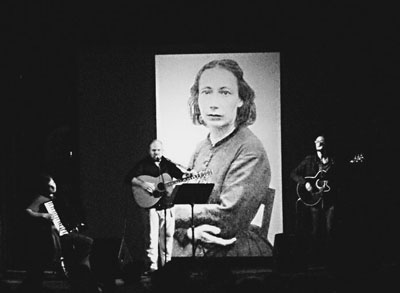
Seven are the paintings of our
exposure.
nightmare
number 0: Genova, July
2001
Dream number 1: la Comune di
Parigi, 18 marzo-22 maggio 1871
Dream number 2:
la scuola la resistenza, 1968-1943
Dream number
3: La piazza, la loggia, la gru. Brescia, maggio
1974-novembre 2010
Dream number 4:
Eterne migrazioni dona loro
Dream number 5:
Banlieus No-TAV, le rivolte degli anni 2000
Dream number
6: l’Unità d’Italia vista da Pontelandolfo, 14
agosto 1861
Dream number 7: noi che
abbiamo visto Genova, luglio 2001.
How do we bring the real storytellers of our paintings: old
photographs, a sequence of still images that accompany the
absolute mobility of the music and words.
Everything except
the veterans want to do! There it was clear that nothing ends up
in Genoa. Genoa gives birth to new stories, like these two that I
deleted from the script, two scenes ("dreams" we called
them), respectively, written by me and Marco Rovelli.
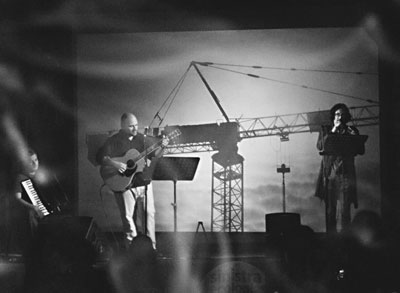
Dream
3: The square, the lodge, the crane. Brescia, May 1974-November
2010
In 2009 he was finally approved amnesty for immigrants
who serve as domestic workers and carers. It is a great hope for
many illegal immigrants working in Italy but live as ghosts, so
they spend and struggle for the mirage of a residence permit, and
who knows, one day, for citizenship. But soon the amnesty reveals
a "package". The Northern League has no intention
seriously, you put the wrong way. Migrants feel cheated.
In
October 2010 in North Italy become principals, and events, but
nobody seems to notice. In Brescia, when even allowed to
demonstrate in garrison is withdrawn, a groupof 6 rooms of
migrants of a crane on the building of underground Piazza Cesare
Battisti.
36 years ago, May 28, 1974 in Piazza Loggia in
Brescia are 10 in the morning. Nearly three thousand people
participating in a demonstration against fascism.
Unexpectedly,
it's cold and raining.
From the stage at the center of the
square about a trade unionist. Will never end the rally because
exactly twelve minutes after his speech was interrupted by the
explosion. 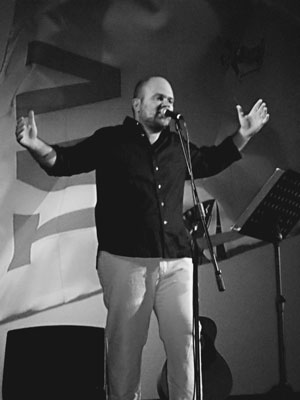
The piazza, the loggia, the crane as a cross in a field of
war
the wind whipped the rain into streams and goes
underground s'infogna
gets lost in the dark alleys of forced,
plots, stories of dark
of time passing, passing, and does not
cure the pain but suspends it.
Suspended in the wind, on the
arm of a crane, there are six immigrant workers
come up to
twenty feet in the cold autumn and clung
a slender thread of a
thought, a hope that burns the wings
that the men at the
bottom to the future, cleansed by hate, is equal to unveil
...
They make fun of the foreign workers / talk
of
amnesties and then are stories / inapplicable legal pitfalls /
heavy taxes against the poorest / years come to Italy /
exploited, cheated / between the need and fear / afraid to show
their faces
to meet a uniform that tell you
"Here you
can no longer stand there" / and so work in the morning /
evening will close at home / and die of nostalgia. / The public
way is a fallacy, there's a ghost town / identity is a paper /
short an illusion, a strange nation.
Here Brescia, northern
production here / here fear the day I arrive / here nothing seems
more alive / the square is a desert / thirty-six years ago / was
an open / for hope and sorrow: it was a port of strength and love
(the May 28, 1974 were in the square, the student and the
professor because a better world starts with a better school).
On the banks of
Square Lodge the rain that falls splash of dark
inky the
sentence that we have left to the future
to tell the
grandchildren of the sons of the absurd state secret
when the
hour arrived for the dead in the wrong place and wrong:
eight dead
eaten by fire, from the URL, the fury, the killers songs
the
outbreak, the drain cleaner of blood in a hurry, leaving the
manholes.
Past ten years, twenty, thirty years that faded
She's mourning
the memory is blind, dying and bereavement
memory is fuzzy thinking.
And thirty-six
years later, twenty feet above it all
six foreign workers
resist at all costs
by October 30 are clinging to a crane
looking down
Phantom of the world that has lost its way down
into the asphalt
ARUN, JIMI,
Rachid, Sajad, SINGH, POPE
names, the sweat, the hours, bolts,
screws, stumbles, cracks
POPE, SINGH, ARUN, Sajadi, Rachid,
JIMI
I am tired to November 10 and two of them down first ...
Still hunger on
the crane and the wind only eleven fifteen
Finally, give the
heroes of despair and fall to the ground
November 15 peg to
peg down
and eight mute presences from Piazza Loggia standard
taking off.
Eight Guardian
Angels are done under the arms
a cross of cranes, the wind
stings my face
how cold it is in tears, Rachid and others have
asked
"Who are you to climb up here on our place?"
Son Julia Banzi
Bazzoli woman, mother, teacher
out one morning in May for one
important thing
I love the body and I have no voice, crashed
into a porch, broken
wait ... I said to my son and thirty-six
years ahead.
And I am soaked
with rain Livia Bottardi Milani
the rain that has bloodied in
May, the rain washes his hands
those who made bombs and hoping
the time gates
the graves in the sea and they remain as
migrants.
I Louis Pinto immigrant, like you, but I came from Foggia
to
work in the north, rain mixed with blood
I came close in a
coffin, his back torn to splinters
Italy gathered in the blood
that still does not protect discrimination.
I, Natali Euplius
/ was here partisan in Brescia / anxiety suddenly caught me / and
I came to the streets to see / what had to be done / what the
liberation / had left in the yard / and came to the streets to
die / you know 'we were in many / with Bartolo Talents / Zambarda
and Victor / we are the "old" street balcony / old
manner of speaking / ready to rise again / on top of the guard
post / because those old memories / and sees the same anguish /
that the horizon down / the old fascism in Brescia / new racism
in the Northern League.
Love the way it teaches that there is
a square of a crane
love that is not broke then it can not
dissolve more
free love and challenge, tell our
schoolchildren
has the name of Alberto Trebeschi and Boots
Clementine
until death do us part, a little ritual phrases'
horrendous
we were husband and wife and an even offends us
by
which a cruel death in a square in May
wanted to break the
item, he wanted to undo the courage
but you still love that
takes us from a square to a crane
courage, piety is not dead
and still clinging there.
(The November 15, 2010 in Brescia
immigrant workers and the ruling came down from the crane on the
massacre of Piazza Loggia definitely put a tombstone on the eight
victims. No one was. Continue the fight.)
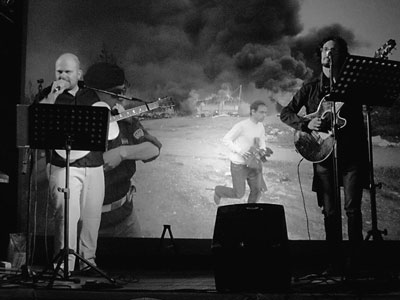
Dream number 5: Banlieus No-TAV, the rebellions of the
years 2.000.
It
starts, again, with the scum to clean,
faceless voiceless
ghosts, but a color
the black ghosts that appear at
night,
blacks more black, the black right to die
no
memorable phrases to be able to remember,
that there is no
time to say them when the end is coming 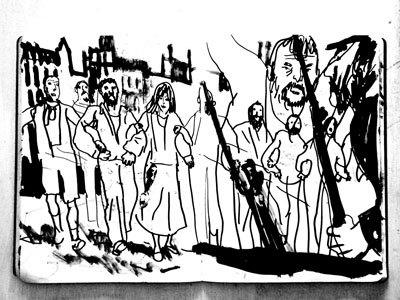
in
an electric car hit a transformer,
and "more light"
as Goethe can not really say
Zyed and
Bounna, adolescents, immigrants born in France,
how wonderful
the paradox, a brand of infamy infinite
the police chasing
them, they find refuge
in the electrical room, and in that
light, the darkness.
The district is
facing, stone-throwing and fires,
and then two days later tear
gas into a mosque
the Minister of Police engages the
battle,
This scum should crush rogue
The
battle rages in the places of call
They crush the scum was the
command
A mechanical hand has performed
The scum has
reacted, took his party
In the heart of
the ghetto decided unanimously
to hit the heart to be the
enemy
to radically clean sweep
a long life is not inert
Torches
to illuminate nights 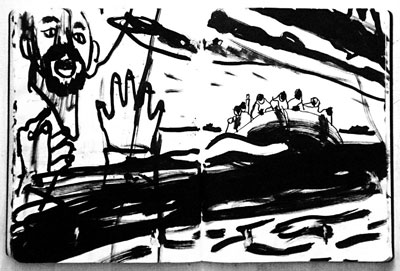
Rise
the cries of the children's children
Light up bare walls of
the buildings
We are here
It starts, again, with the city requiring
sense of the word
gaze law, the master's voice
the campaign, and the mountain,
without any conditions,
immolino is to progress, to his great
Reason
mega immense that
does not stop and wait
those who waste time asking questions,
Who needs it? What is it?
Who pays? Who decided? Why this
violence?
And then in Val di Susa a new resistance
Twenty years is
a long time, someone is born and who dies,
generations that
proceed in the same direction,
embedded in the ground, in the
sense of the Municipality,
and no one is immune to this
contagion
Against
the tunnel on the lawns were resistant at Venaus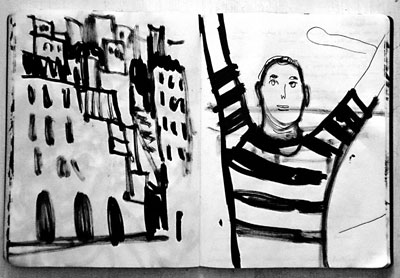
the police arrived: heads and shattered bones
the resistance
returned from the paths of the forest,
they resumed their
lawns, and other years have passed
In the pitched battle
of Chiomonte Magdalene,
scores of policemen and scores of
bodies on which to spend
but you continue to resist with the
absolute conviction
that this is the only reason to be
together.
Resists the command
of endless progress,
with weapons and violence requires the
sacrifice
resist destruction is my mother having
there is
no other sovereign decision
This is my land, but
also who is
my land is binding only those who refuse
oppose
the god of money is a matter of conscience
a natural
resistance to
Torches to illuminate
the mountains
Rise to the songs of children's children
The
Bald Wall lights at night
We are here
 Alessio Lega
Alessio Lega
alessio.lega@fastwebnet.it
|